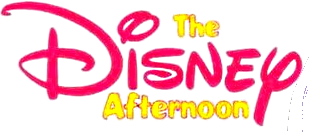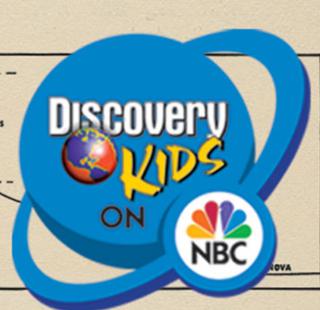Related Research Articles

Disney Channel is an American pay television channel that serves as the flagship property of Disney Branded Television, a unit of the Disney Entertainment division of The Walt Disney Company.
"Saturday-morning cartoon" is a colloquial term for the original animated series and live-action programming that was typically scheduled on Saturday and Sunday mornings in the United States on the "Big Three" television networks. The genre's popularity had a broad peak from the mid-1960s through the mid-2000s; over time it declined, in the face of changing cultural norms, increased competition from formats available at all times, and heavier media regulations. In the final two decades of the genre's existence, Saturday-morning and Sunday-morning cartoons were primarily created and aired to meet regulations on children's television programming in the United States, or E/I. Minor television networks, in addition to the non-commercial PBS in some markets, continue to air animated programming on Saturday and Sunday while partially meeting those mandates.
The New Adventures of Winnie the Pooh is an American animated television series produced by Walt Disney Television Animation. Based on the Winnie-the-Pooh books by authors A. A. Milne and E. H. Shepard, The New Adventures was the first time a major Disney character headlined an animated, made-for-television series as well as the first Disney television series based on a major animated film. The cartoon premiered with a limited run on The Disney Channel on January 17, 1988. Nine months later, the show moved to ABC as part of their Saturday morning lineup. New episodes continued until October 26, 1991. Proving popular with children and older fans, it remained a staple on television in the United States for nearly two decades.

The Disney Afternoon, sometimes abbreviated as TDA, was a created-for-syndication two-hour programming block of animated television series. It was produced by Walt Disney Television Animation and distributed through its syndication affiliate Buena Vista Television. Each show from the block has aired reruns on Disney Channel and Toon Disney. Disney Channel reaired four shows on "Block Party," a two-hour block that aired on weekdays in the late afternoon/early evening.

The Walt Disney Company has produced an anthology television series since 1954 under several titles and formats. The program's current title, The Wonderful World of Disney, was used from 1969 to 1979 and again from 1991 onward. The program moved among the Big Three television networks in its first four decades, but has aired on ABC since 1997 and Disney+ since 2020.

ABC Kids was an American Saturday morning children's programming block that aired on ABC from September 13, 1997 to August 27, 2011. It featured a mixture of animated and live-action series from Walt Disney Television Animation and Disney Channel, aimed at children between the ages of 6 and 14. This was the only time Disney Channel content aired on over-the-air television in the United States.

Fox Kids was an American children's programming block and branding for a slate of international children's television channels. Originally a joint venture between the Fox Broadcasting Company (Fox) and its affiliated stations, it was later owned by Fox Family Worldwide.

Disney's One Too was an American two-hour Sunday-to-Friday children's programming block that aired on UPN from September 6, 1999 to August 29, 2003. A spin-off of the Disney's One Saturday Morning block on ABC, it featured animated series from Disney Television Animation aimed at children between the ages of 6 and 11.

Discovery Kids on NBC was an American children's programming block that aired on NBC from October 5, 2002 to September 2, 2006. The block was produced under a time-lease agreement with Discovery Kids, and features a mixture of live-action and animated series originated on the cable network that met educational programming requirements defined by the Federal Communications Commission.
A weekday cartoon is the colloquial term for the animated series programming that was typically scheduled on weekday mornings and afternoons in the United States on many major television networks and in broadcast syndication since the 1960s.

UPN Kids was an American children's programming block that aired on UPN from September 10, 1995 to September 5, 1999. Airing on Sunday mornings, the block aired for one hour, then two hours the following year.
Saturday morning preview specials were aired on television annually to present previews of each network's fall lineup of Saturday-morning cartoon children's programming. Similar to the model for their new prime time counterpart shows, television networks in the United States and Canada would film a preview special for the fall season. These would often air as part of the regular network schedule, or be made available to their affiliates for airing at any time, especially to fill timeslots which contained programming canceled months before.
American cable and satellite television network Freeform was originally launched as the CBN Satellite Service on April 29, 1977, and has gone through 4 different owners and 6 different name changes during its history. This article details the network's existence from its founding by the Christian Broadcasting Network to its current ownership by The Walt Disney Company, which renamed the network to Freeform on January 12, 2016.
Children's programming has played a part in NBC's programming since its initial roots in television. This article outlines the history of children's television programming on NBC including the various blocks and notable programs that have aired throughout the television network's history on weekends.
In regard to children's television programming, CBS has aired mostly animated series, such as the original versions of Scooby-Doo, Fat Albert and the Cosby Kids, Jim Henson's Muppet Babies, Garfield and Friends and the 1987 incarnation of Teenage Mutant Ninja Turtles. This article outlines the history of children's television programming on CBS including the various blocks and notable programs that have aired throughout the television network's history.
The broadcast of educational children's programming by terrestrial television stations in the United States is mandated by the Federal Communications Commission (FCC), under regulations colloquially referred to as the Children's Television Act (CTA), the E/I rules, or the Kid Vid rules. Since 1997, all full-power and Class A low-power broadcast television stations have been required to broadcast at least three hours per-week of programs that are specifically designed to meet the educational and informative (E/I) needs of children aged 16 and younger. There are also regulations on advertising in broadcast and cable television programming targeting children 12 and younger, including limits on ad time, and prohibiting the airing of advertising for products related to the program currently airing.
The Hearst Media Production Group is an American media and production company based in New York City, New York as a division of the Hearst Television subsidiary of Hearst Communications, with three additional offices in Boston, Washington, D.C., and Burbank, California. Many of HMPG's programs comply with federally mandated educational and informational requirements.

Weekend Adventure is an American syndicated programming block that is produced by Hearst Media Production Group, and airs weekend mornings on the owned-and-operated stations and affiliates of ABC. The block features live-action documentary and lifestyle series aimed at a family audience that meet educational programming requirements defined by the Children's Television Act. Announced on May 24, 2011, Litton's Weekend Adventure premiered on September 3, 2011, replacing the ABC Kids block.
The 2020–21 daytime network television schedule for the five major English-language commercial broadcast networks in the United States covers the weekday and weekend daytime hours from September 2020 to August 2021. The schedule is followed by a list per network of returning series; no new series, but only one series is canceled after the 2019–20 season are included at present, as the daytime schedules of the four major networks that offer morning and/or afternoon programming is expected to remain consistent with the prior television season.
References
- ↑ Holz, Jo (2017). Kids' TV Grows Up: The Path from Howdy Doody to SpongeBob. Jefferson, NC: McFarland. ISBN 978-1-4766-6874-1.
- ↑ Goldman, Michael (September 15, 1997). "ABC hopes for virtual success". Variety . Reed Business Information . Retrieved March 29, 2015.
- ↑ Grove, Christopher (August 29, 1997). "Webs roll out season geared to kids". Variety. Reed Business Information. Retrieved August 13, 2009.
- ↑ Pursell, Chris (July 19, 1999). "Mouse brands UPN kidvid". Variety. Reed Business Information. Retrieved August 13, 2009.
- ↑ DiOrio, Carl (October 24, 2001). "Fox Family costs Mouse less cheese in final deal". Variety. Reed Business Information. Retrieved August 13, 2009.
- 1 2 Bernstein, Paula (September 29, 2002). "Kid skeds tread on joint strategy". Variety. Reed Business Information. Retrieved August 13, 2009.
- ↑ Littleton, Cynthia (May 12, 2010). "Saban re-acquires rights to 'Rangers'". Variety. Penske Media Corporation . Retrieved May 12, 2010.
- ↑ "Litton Entertainment to Produce and Distribute Original Programming for ABC Stations for Fall 2011". Litton Entertainment. The Futon Critic. April 19, 2010. Retrieved May 11, 2020.
- 1 2 "ABC Orders Saturday Kids Block From Litton". TVNewsCheck. NewsCheck Media. May 24, 2011. Archived from the original on December 4, 2013. Retrieved May 24, 2011.
- ↑ "ABC to Premiere ABC Weekend Adventure on Sept. 3". Broadcasting & Cable . NewBay Media. May 24, 2011.
- 1 2 "Litton Announces "ABC Weekend Adventure"". Business Wire . May 24, 2011.